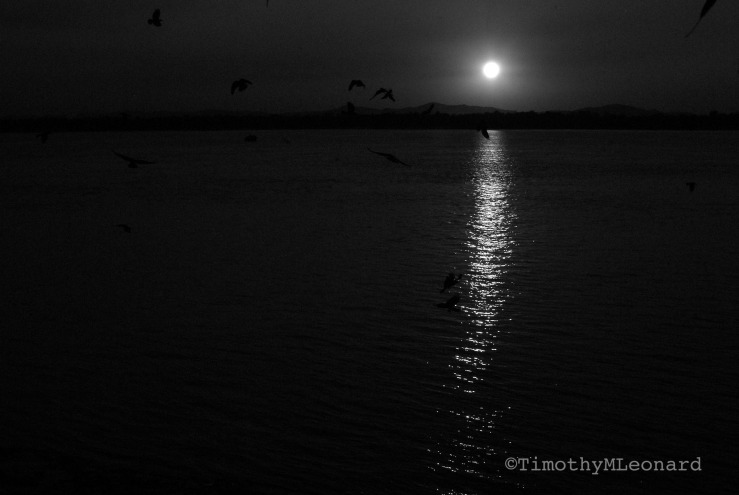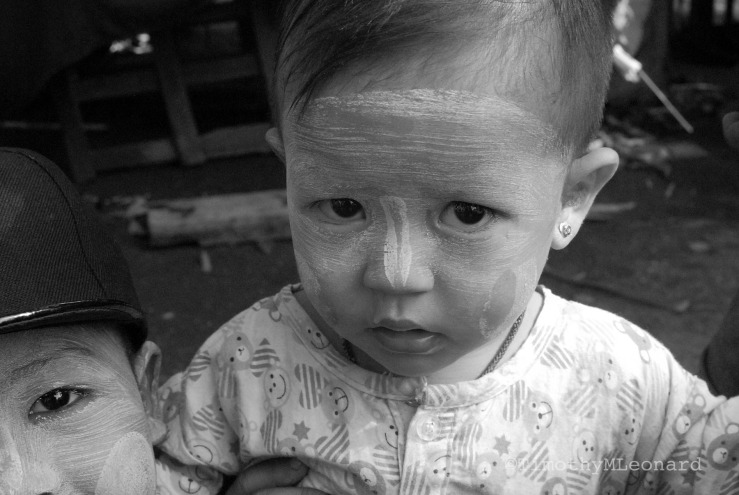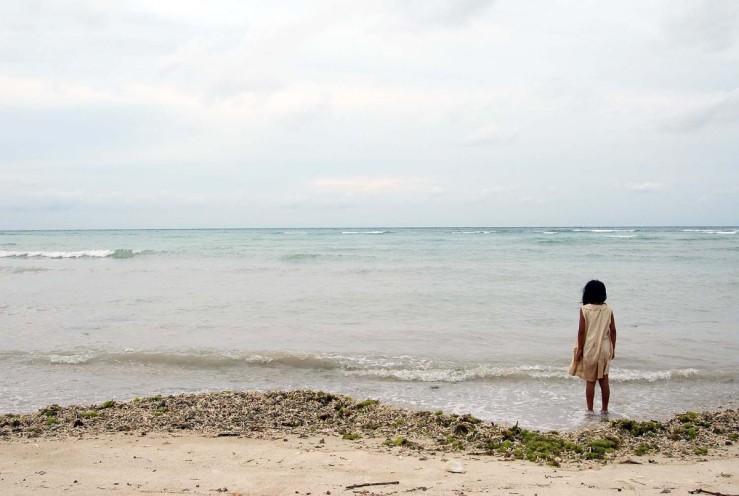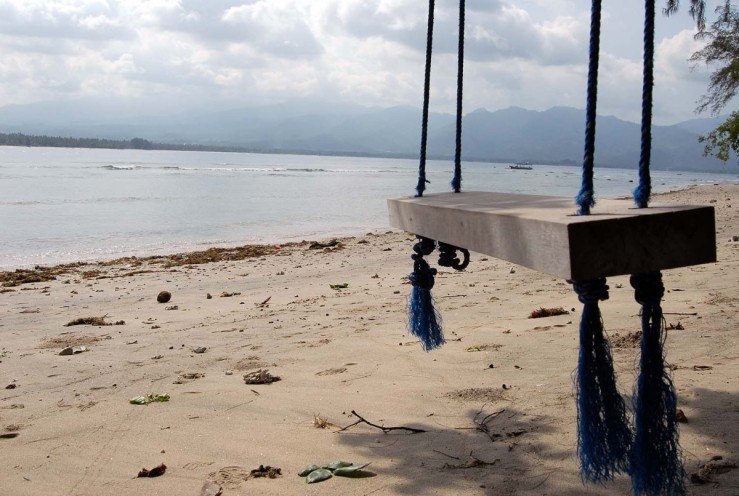I reached Downings in wild northern Donegal on the shore of Sheephaven Bay. Downings had a population of a few hundred, an ideal place for camping in a caravan, golfing, dancing, and vacations from urban life during short summer months. There was a tweed factory, a grocery store with bottled gas for residents and visitors, pubs, small hotels, a sweater and scarf shop.
Carrigart, a mile away was larger with a church, post office and small shops. I thumbed a ride with Pat driving a weekly Friday minivan to and from Melmore Head into Carrigart so local people could get in for shopping. He’d never seen someone standing along the road with a fire engine red word machine.
I climbed aboard, thanked him for stopping and we climbed high along the Atlantic Drive with exquisite views of bays and shorelines unfolding like perpetual flowers.
Women passengers rattled away in Gaelic. I processed new language.
“Is he a warlock?” Deirdre of the Sorrows whispered.
“I’m not sure we want to find out,” Mary, a virgin, said. “Maybe a Druid. Let him be.”
“Just as well. Well, I never,” said Deirdre. Mary nodded with a solemn expression across her deeply lined face. They studied their sturdy shoes. Built for comfort, not for speed. They were disinfected against English hoof and mouth viruses. They left attachments alone.
They remarked how isolated Donegal was in winter and asked was I alone? “Oh,” one said, when the conversation turned to my portable machine, “Is it a book you’re working on and how is it coming along?”
“It’s a process. I’m incorporating various Irish themes, like isolation, violence, hatred, anger and fear. I include gaiety, laughter, love for music, verse, a good craic, witty erudite conversation, the ability to laugh at oneself, self deprecation, and finding pleasure in small simple things, small simple elegant ways of life.”
“Yes,” said one woman. “That’s a mouthful. How grand!”
“So it is,” I replied pulling out yellow lined paper.
“This is Empirical Evidence. I use it for a first draft making notes as I go along. It’s perfect for this kind of job.”
I showed them the bold blue word 'Evidence.'
“It collects source material, because we remain open. We acknowledge we are the source, in a sense, beyond sense really, we are the fundamental shift, each of us possesses the innate universal capability to create and embrace metta, the loving kindness that permeates through the various meridians - we tap into the source, we transmute through fields of energy, resolving, flowing toward the source, the infinite vibrations of love.”
The women were stoned. Dolmans.
I rattled on, “Some authors prefer to use these yellow papers when they create stories, characters and the motivation which carries them from scene to scene. It flows. I write with a cloud pen on mirrors. Creating amnesia. The clouds should know me by now. It’s a strange mixture of life and death, so it is.”
They stared in amazement listening to my blue streak. They’d swear I was on fire.
“I’m reminded of a journal I purchased in Ubud, Bali, Indonesia. Lovely place, that. Primitive, rice paddies, jungle, magical mysterious light. Ambient. Gentle people. Every day is a celebration. Nine levels of language depending on their caste system.”
I switched back to varieties of paper products.
“Yes, it’s a tight, flat, hard rough paper, badly stitched and all, and while it is useful and shaking in laughter it is not as free as this evidence. Two more journals are filled. One sits empty & blank.
“You cannot tear out the pages in a journal unless you want to upset the balance, the conformity, but with this, yes, you must remove each yellow bird call from its throat. My goals are to freely develop and strengthen my creative identity. I accept my playful personality and cultivate an inner attitude of strength. I will destroy old myths, preconceptions and false lies. My path will toughen my skin while leaving my interior soft and pliable.”
The women had never heard anything like this before.
“Enjoyment is Puer Aeternus or ‘eternal youth’ and, in a sense, that’s what I’ve been doing, living and being for God knows how long as an arrested adolescent. I was crystallized at an early age.
“I finally confronted my perceived laziness and stalling. They are buzzwords, you know what I mean, buzzwords of an autocratic, punishing consciousness. That’s the price I pay for being raised a Catholic. Way too much emotional and physical abuse and suffering in my family if you know what I mean.”
The women rolled their eyes toward heaven and blessed themselves with the speed of an illusionist. The hand - a tool with opposable thumbs, quite remarkable grasping anything of value an age old dilemma for masses. Faster than the eye.
Their dancing hands revealed stories. Stories about waiting and patience, patience enlarging, expanding space creating the illusion of grandeur, opulence and distance.
“Yes,” I said. “If you can hold it in your hand it’s not important. An open hand holds everything.”
I almost started telling the women about the wild monkey mind construct from an Eastern point of view - one of those ancient stories they’d never heard of - and then I remembered, speaking of monkeys, while taking care of Eoin on the edge of Dublin, when we passed an elementary school one afternoon and went in. The doors were unlocked and the hallways empty and no one around. The two of us wandered into a classroom. On a wall was a poster of a monkey.
The caption said, “Do you know why monkeys can’t talk?” Underneath it said, “Because they are afraid humans will put them to work!” I laughed. We found an exit, walked across an empty playground, down an alley and back to the mean old street.
The Donegal bus rolled past sheep wearing long white coats grazing on miles of green leading to the wild sea, to the edge of the unknown waiting for spring’s shearing, fighting fear receiving disinfectants from laughing, cursing men in black Wellington boots spraying abstract splashes of red paint on white coats indicating they were disease free.
“My antidote is patience, acceptance and trust which is part of the mystery of creativity and creation. My active patient skills allow a strong bond of trust between the ego and creative child,” I whispered to the women.
We rattled around curves, passing stoned fields lying fallow, cold, hard soil where generations dug potatoes before they starved or escaped famines in 1840 sailing toward England or Boston with a few scarce pence in ragged pockets dreaming of better futures trying to stay alive long enough to begin to forget to remember those who didn’t make it and wouldn’t make it.
They ate grass crawling miles finding nothing remembering all the harvests sitting in English warehouses stolen by absentee landlords. Fat British rats ate corn and wheat, and those who managed to scrape enough together got off the island as best they could from Cork or Belfast or Galway, in thick rolling seas with no idea, absolutely no way of knowing, when or where they would finally land, holding a foreign address scrawled on a scrap of paper if they had the luck of the Irish; telling, sharing gentle histories, legends, myths, fabrications and stories to their children through generations easing hunger, memory, remembering everything and as we rolled along I knew it was still hard and not much easier now even with money coming back from across the water knowing the women might never see their children again, for their sons and daughters had left the soil, sky and water on their diaspora, became wild geese and it was all a metaphor in my mind’s restless eye.
“I sing,” I shouted toward land’s end where water smashed rocks, “Long live the creative child!”
“Oh, I see,” one matriarch said. “I like the God part. Don’t you, Mary?” she said, gesturing to her friend who was in a state of shock.
“To be sure, to be sure,” Mary said. And they let it go.
“Yes,” I agreed, pulling a mirror out of my pocket, wrapped in brown and red gringsing. It was long enough to be a scarf, very thin in places with frayed threads. It had a rough coarse texture, smelling of jungle, vats of water and wood ash.
“This is a magic cloth from Bali. It is woven in a process called ikat. The word ikat means to tie or bind and protects this talisman I carry with me as I travel inner and outer worlds. This mirror was a gift from a woman down in Dublin. It manifests Beauty. The universe gives us what we need whether or not we know we need it.”
I turned the mirror toward them. The women looked into gleaming glass. They saw their past, present and future lives all rolled into one powerful flash of light. It was a vision reflecting their joy, sadness, regrets, hope, charity, wisdom and love. The looking glass showed them their birth, middle age and death.
They saw An Gort a Mor, the great hunger and sat back sucking air.
Carrigart was the edge of their world.
“I see,” Mary said, looking up and straight into my blue eyes. They reminded her of a snow leopard, a wild, sharply focused nocturnal predator comfortable at higher elevations existing in an independent, solitary way.
“Then,” I said smiling, pointing to the red machine on the seat, “I download the images into this,” sliding the talisman mirror into my pocket.
“Of course, it’s a manual. They don’t make them like that anymore. Better than staring at a small screen full of radioactive electrons and clicking on a mouse.”
“I should say not,” Mary said. She preferred lead sharpened to a point.
I was trapped on an endless ride to the edge of my life. More questions. Where was I from, what’s America like, why did I leave the land of milk and honey as locals so well put it. On and on. Was I married? No. Did I miss my family?
“No, not really. My grandfather, named Malarkey, immigrated from Sligo during the famine, married Hanna Haley in St. Louis, ended up in Colorado Springs where my folks were born and my rudimentary research at Dublin Castle indicated genealogical records burned in a Sligo church fire years back.”
So much for hard circular factual data.
“My family, while emotionally cold, distant and abusive yet well-intentioned, kind and loving were rather dysfunctional, trying to understand my vagabond spirit nature. They had no choice in the matter and by now they’re used to receiving strange word-strings full of mysterious symbolism and tragic truths from diverse twilight zones. I transmit between crystals and gringsing decorated with universal binary codes.”
“Really now?” said Mary.
“Yes, I gave my folks a world map for their anniversary. They loved it, inviting friends, neighbors and strangers over for trivia games using postmarks, stamps, decals, flotsam, thread, needles, bark, cactus fiber, beads, charts of tributaries, topographical maps, animal skins, hieroglyphics, and Tibetan prayer wheels with Sanskrit characters.
“They caressed burned broken shards of Turkish pottery, Chinese bamboo brushes dripping blood, torn out pages from esoteric Runes, Paleolithic fertility symbols, vitreous unusual writing, and one of my favorites, a Quetzalcoatl image full of written narration based on the oral performances of Central American myths.
“Fascinating,” said Deirdre.
“Yes, I gave them Olmec nahuales shamans containing animal powers dating back to 1200 B.C. speaking their wisdom. They blended the spirituality and intellect of man with the ferocity and strength of the Jaguar to create their nahuales. Their soul required an animal medium to travel from the earth to the heavens and into the underworld.
“Additional cultural reminders were beautiful blank black mirrors. Some displayed faces, others contained scripts written backwards with stories of people, geographies, forbidden objects, and a box called Pandora.
“This was one of their favorite things. They never knew, from one exploration to the next, what they’d find in the box I sent them from the journey. One realization they experienced with Pandora was how they behaved differently, listened more, spoke less, almost as if they were communicating via telepathy or kinesthetic dimensions, within the exotic flow of spirit energies bathing them in a crystal light. They slowed down.
“Yes, they didn’t know what to make of it whenever something mysterious, fascinating, and totally intriguing reached them from General Delivery far away from their daily existence working to pay for a house mortgage, car, food, terrorism insurance and child care.
“You don’t say,” said Mary.
“Oh my yes. They were very busy paying for old age retirement mutual fund investments, 401K plans, nursing home deposits, energy supplies, basic utilities, telephones, cable service and clothing. They were busy buying firewood, utensils, making down payments on memorial cemetery plots up at Olivet, contraceptives, gardening supplies, and various used useful tools on clearance at Goodwill and Thrift stores to make ends meet. They pleaded for some rational, scientific explanation trying to understand what a diamond and thread had in common.”
He’d lost the dear ladies.
I changed the subject and mentioned Leonardo Da Vinci. “He wrote backwards on glass to eliminate thieves and kings from stealing his ideas. He was persecuted for his beliefs. Being left handed, his writing is called mirror writing so it wouldn’t smudge. It’s an art to write in the reverse direction. Writing is directly connected to the heart.”
“Aye,” Deirdre said, crossing herself. “Such a hard life.”
They understood this concept and blessed themselves.
“Mother Mary,” one said, imagining snakes supporting turtles and elephants in gardens full of tempting fruit and rapacious Sermons on the Mount of Venus. Visions of angels danced in her head like sugar plum Irish fairies near Catholic confessionals full of hard wired guilt at that, remorse, and abject self pity.
“Yes,” I suggested, “It’s about gratitude, forgiveness, and abundance.”
I found the courage to inform the highly inquisitive women I am/was/will be a fili - a poet - which explained everything they’d ever need to know, care to know or dream of knowing in their own unique dying tongue. Muttering between themselves in Gaelic they didn’t assault me with any more questions.
I knew the value of not talking the material out. I'd learned that lesson the hard way. I’d realized the inherent magic power of spoken tongues, how stories became distilled through the telling, how they became shape shifters. How they manifested new winged flight. How they lost their magic through the telling.
I knew Omar would murder more of his darlings through the unfolding process. They’d be sentenced.
The bus passed two gravediggers turning soil high on purple heather hills. Digging as a metaphor for poetry.
Pat dropped Mary and Deirdre off near stony paths lined with moss leading to small isolated whitewashed homes tucked into seaside bluffs next to verdant green hills full of grazing sheep on rocky outcrops winding through winter fields at the edge of the Atlantic.
“Slan go foill,” I sang, bidding them fare-thee-well. They waved in amazement hearing my perfect Gaelic accent float into perpetual rain on a soft day. The sky was crying.
“Mind yourself. God Bless.”
They walked home on a narrow path in a hard simple life of blessings. Blessings in the small things they treasured, small ways they stayed connected to the ground, intimate rocky soil, nurturing their children, supporting their husbands through difficult economic times, waiting for their arrival from the sea or fields from the night of their desire and longing, from the edge of their darkness; crying farewell to immigrants, welcoming children now approaching middle age with their wives, husbands, grandchildren from far flung journeys to a world’s end, living in bright lights, big cities with unpronounceable names, sailing past a lighthouse spinning incandescent beams, dancing in lonely isolated whitewashed Donegal community centers hanging on the edge of the sea surrounded by laughter, hearing men and women gossip, playing tin whistles, pipes and reed instruments of eternal sadness and gaiety as seasons spun their magic past worn callused fingers breaking hard brown blocks of tea crumbling fragments into boiling water, pouring their lives into chipped delicate cups, genuflecting and blessing their faith on Sundays hearing sermons about redemption, hope, promise and charity.
They lived good simple uncomplicated lessons in determinism and survival versus free will, facing tests of spiritual blessings, cherishing the testing of their spirit on their looms spinning flax, treadles providing a gentle musical rhythm with shelter, solace, a place of gathering making it happen in their lives.
A Century is Nothing











 Share Article
Share Article 






